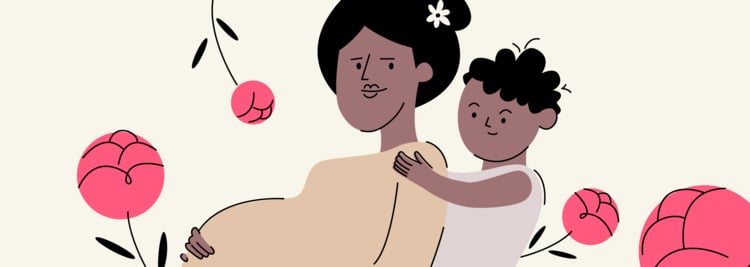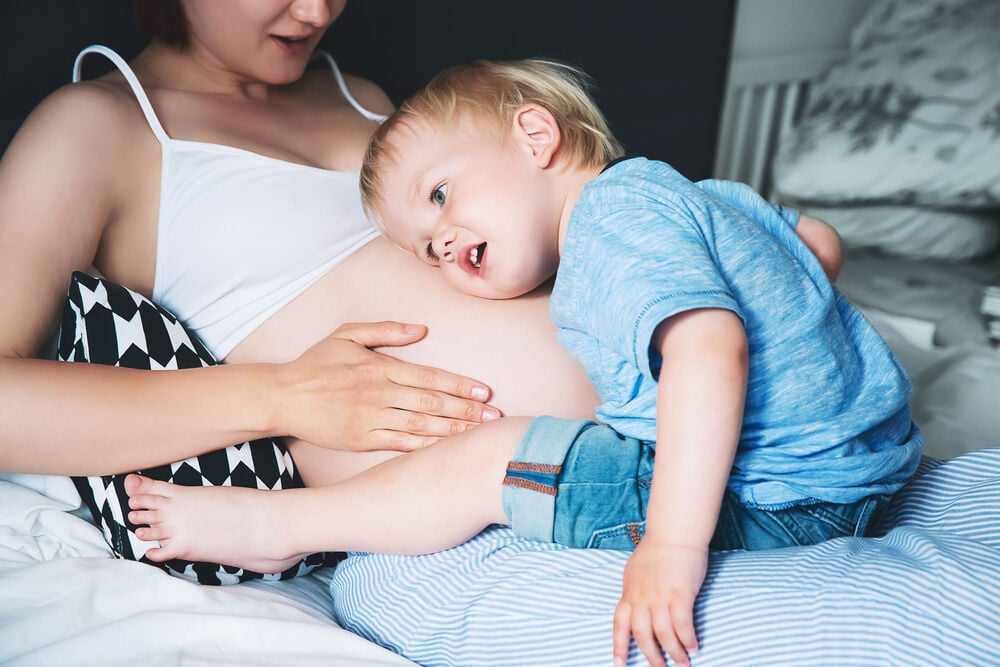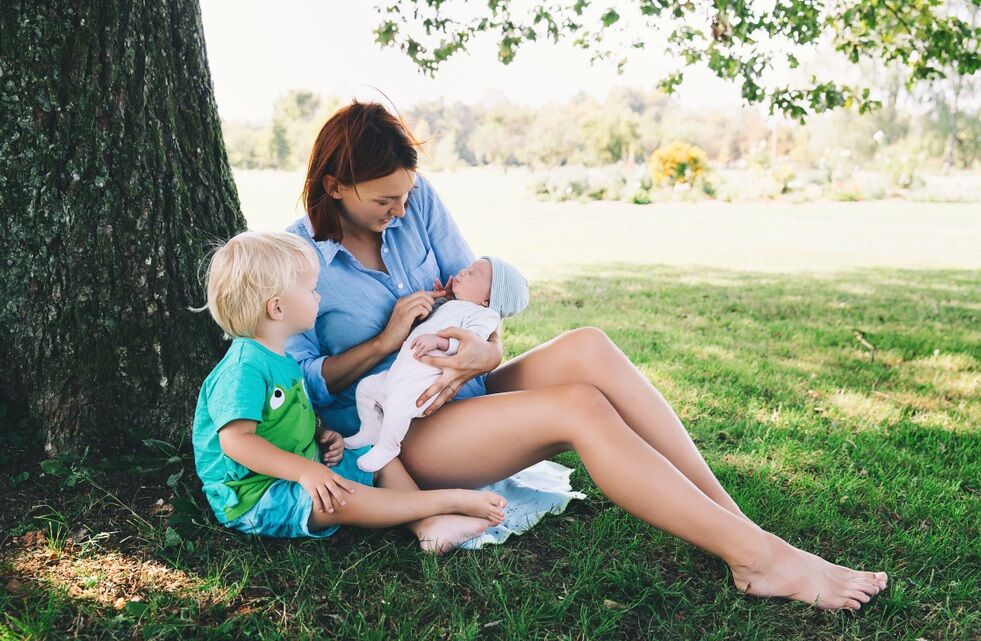You may feel like a pregnancy pro after having been through it once, and in many ways you are. What you may not know, though, is that your second pregnancy can be completely different from your first. Discover some of the changes you can expect as you start the exciting journey of becoming a mom for the second time.
-
Tracking cycle
-
Getting pregnant
-
Pregnancy
-
Help Center
-
Flo for Partners
-
Anonymous Mode
-
Flo app reviews
-
Flo Premium New
-
Secret Chats New
-
Symptom Checker New
-
Your cycle
-
Health 360°
-
Getting pregnant
-
Pregnancy
-
Being a mom
-
LGBTQ+
-
Quizzes
-
Ovulation calculator
-
hCG calculator
-
Pregnancy test calculator
-
Menstrual cycle calculator
-
Period calculator
-
Implantation calculator
-
Pregnancy weeks to months calculator
-
Pregnancy due date calculator
-
IVF and FET due date calculator
-
Due date calculator by ultrasound
-
Medical Affairs
-
Science & Research
-
Pass It On Project New
-
Privacy Portal
-
Press Center
-
Flo Accuracy
-
Careers
-
Contact Us
Second Pregnancy: What to Expect from Pregnancy with the Second Baby


Every piece of content at Flo Health adheres to the highest editorial standards for language, style, and medical accuracy. To learn what we do to deliver the best health and lifestyle insights to you, check out our content review principles.
Belly growths
One noticeable difference between your first pregnancy and your second is you'll likely start showing a baby bump sooner. Some women say they were only 8 weeks along when they couldn't button their pants anymore.
The reason behind this early baby bump is that your abdominal muscles and skin expanded during your first pregnancy, which makes it possible for them to stretch more quickly. This means you may have to switch to maternity clothes sooner than you did in your first pregnancy.
Pregnancy symptoms
Some unpleasant pregnancy symptoms may manifest earlier than they did during your first pregnancy, such as back pain, fatigue, and nausea. But since all pregnancies are different, it’s normal to not experience any pregnancy symptoms at all.
Back pain may present itself earlier since your stomach muscles are weaker. To help alleviate it, make sure to wear comfy shoes, such as sneakers with good arch support, and keep a pillow between your knees while you sleep for additional comfort.
If you experienced hemorrhoids or varicose veins during your first pregnancy, it's likely you'll experience them again, and maybe even sooner. The best way to avoid hemorrhoid flare-ups is to avoid constipation, which means drinking plenty of water and eating a healthy, high-fiber diet full of fruits and vegetables.
Some unpleasant pregnancy symptoms may manifest earlier than they did during your first pregnancy, such as back pain, fatigue, and nausea.
You may feel even more tired this time around. To help mitigate this, make sure to delegate what responsibilities you can to your partner.
As for morning sickness, it can be less intense during the second pregnancy.
Baby position and movement
Take a quiz
Find out what you can do with our Health Assistant

For your second pregnancy, you may feel the baby move earlier than you did the first time, and this is mostly because you're more aware of your body. The first time around, you might have attributed those initial flutters to gas or indigestion, but now that you've experienced it, you may recognize those flutters as the baby moving. It’s possible to feel them as early as 14 weeks, or right at the beginning of your second trimester.
Remember to seek urgent medical advice if:
You haven't felt your baby move at all by 24 weeks.
Your baby moves less than is usual for them.
Your baby moves less than 10 times in 1-2 hours (in trimester 3).
For your second pregnancy, you may feel the baby move earlier than you did the first time, and this is mostly because you're more aware of your body.
The baby may also lie lower in the abdomen, which can contribute to increased back pain and body aches.
Physical state
As mentioned above, you'll probably feel more tired than you did the first time, but a lot of that is likely related to having a young child to care for in addition to attending to your own needs. Make sure to take the supplements your doctor recommends, and ensure you're eating a well-balanced diet.
Labor and delivery
At the end of your third trimester, when it's finally time to give birth to your new bundle of joy, you'll likely notice some positive things during labor and delivery that differ from your first pregnancy. So that's good news if you've still got some birth fears despite having done it once already.
If you had a C-section the first time, it's likely you'll have one again, but at least this time, you'll know exactly what to expect.
If you've had a vaginal birth already, some stretching is likely to have occurred, which means your delivery should theoretically be quicker and easier. There's no guarantee, of course, because every woman and every pregnancy is different, but many women report having an easier time with labor and delivery for their second pregnancy.
If you had a C-section the first time, it's likely you'll have one again, but at least this time, you'll know exactly what to expect.
Afterpains
After your second child's birth, you'll probably have more intense afterbirth pains. These cramp-like contractions are caused by the uterus returning to its pre-pregnancy location and size after giving birth.
Afterbirth pains may be more painful for second-time moms. This is because after your first pregnancy, the muscle tone of your uterus was stronger, so when it would contract, it would stay contracted, rather than relaxing and then contracting again.
Breastfeeding

Breastfeeding after your second pregnancy is bound to be easier, especially if you have done it before with your first child. Some studies have also shown that physical changes in your mammary glands, located within your breasts, make them more ready to deliver milk the second time around.
Breastfeeding after your second pregnancy is bound to be easier, especially if you have done it before with your first child.
If you're breastfeeding your first child while you're pregnant, you may find that your baby will start to wean on their own, since some studies have shown that milk may taste distasteful as your placenta continues to grow and milk production drops. This can be nature's signal to your first child that they may not need to breastfeed anymore.
And if your child doesn't wean themselves, you may decide to wean them off during your second pregnancy if your breasts feel very tender or you're too tired.
Mental state
Mentally, you may be in a different place during your second pregnancy than you were during your first. Even though you've been through it before, so you know what to expect, you may have less time to enjoy your second pregnancy now that you have a child to look after at the same time. To help manage your mental state, consider implementing some of these suggestions:
- Ask friends, family, or your partner to help out whenever possible to look after your child so you can have some much-needed time to yourself.
- When your partner comes home from work, ask them to help out with taking care of your first child while you relax and recharge.
- If you're working through your second pregnancy, consider taking off a full day or half-day here and there to make sure you're getting plenty of rest, and leave your first child in the care of a trusted relative or friend.
- Build exercise into your day if you can to keep your mental health in a good state.
- Take advantage of online shopping conveniences to prevent having to go to the store as often.
Hopefully, you have a better understanding of what to expect during your second pregnancy, and downloading a pregnancy tracking app like Flo can help with this further. Remember, though, that every woman and every pregnancy is different, so what you experience may not align exactly with what you’ve read here.


Hey, I'm Anique
I started using Flo app to track my period and ovulation because we wanted to have a baby.


The Flo app helped me learn about my body and spot ovulation signs during our conception journey.


I vividly
remember the day
that we switched
Flo into
Pregnancy Mode — it was
such a special
moment.
Real stories, real results
Learn how the Flo app became an amazing cheerleader for us on our conception journey.
References
History of updates
Current version (09 January 2023)
Published (16 September 2019)
In this article

Get your personal guide to pregnancy with the Flo app
-
Follow your baby's growth week by week
-
Get expert info on symptoms, safe foods, and more
-
Chat with other parents-to-be




